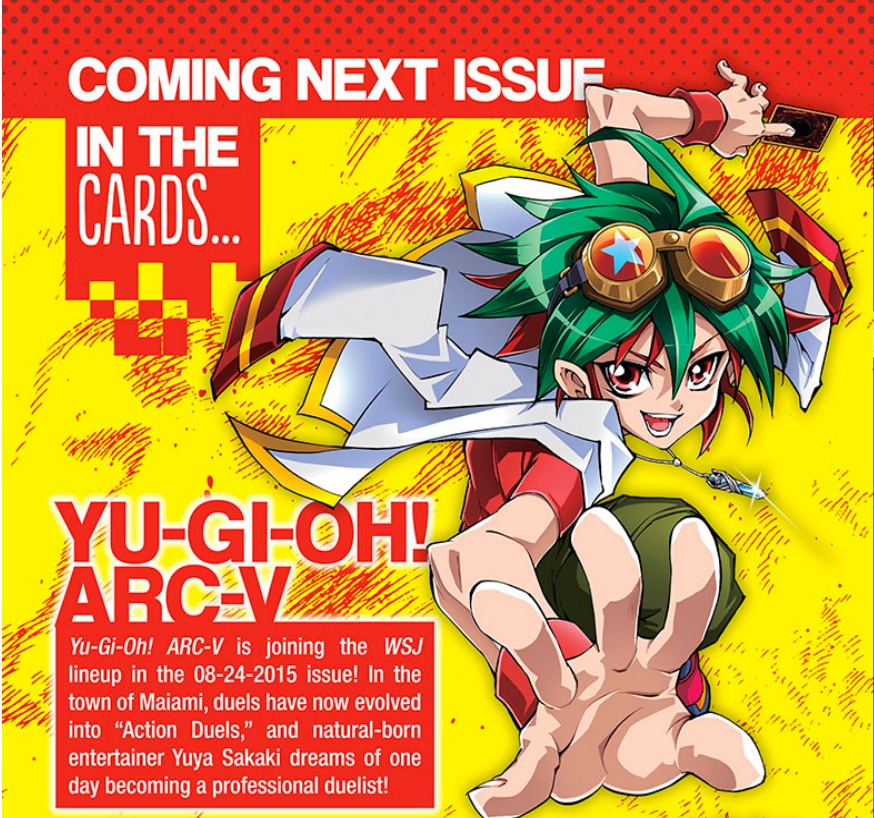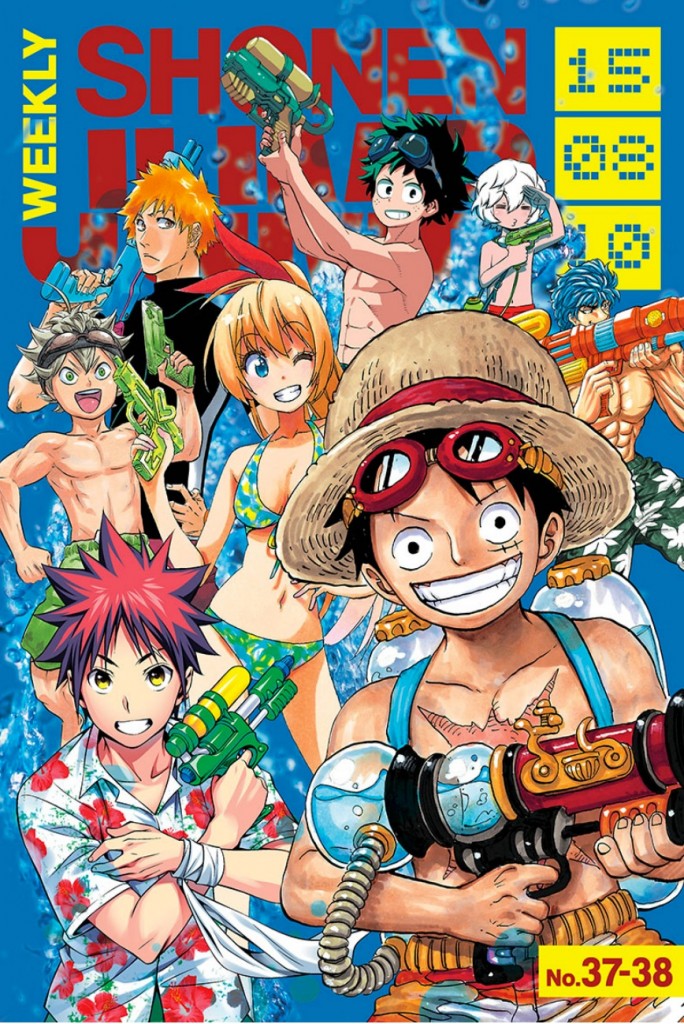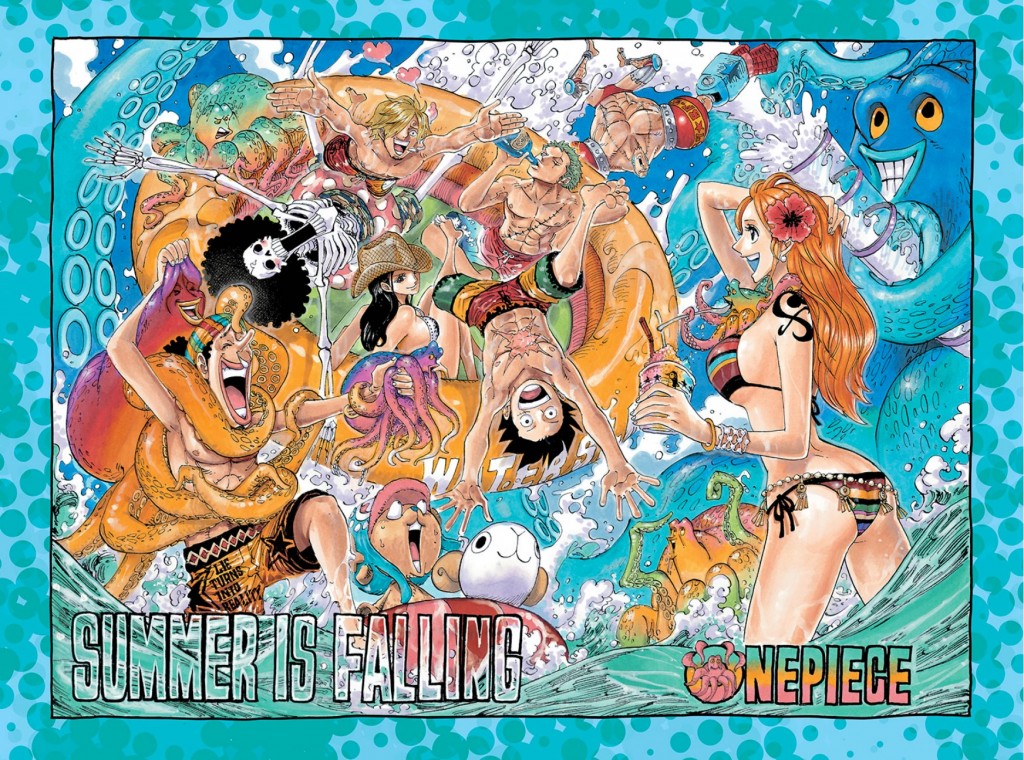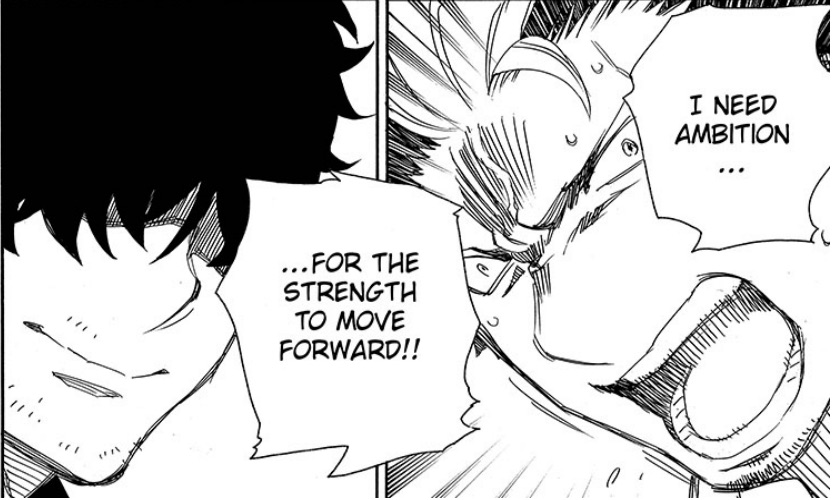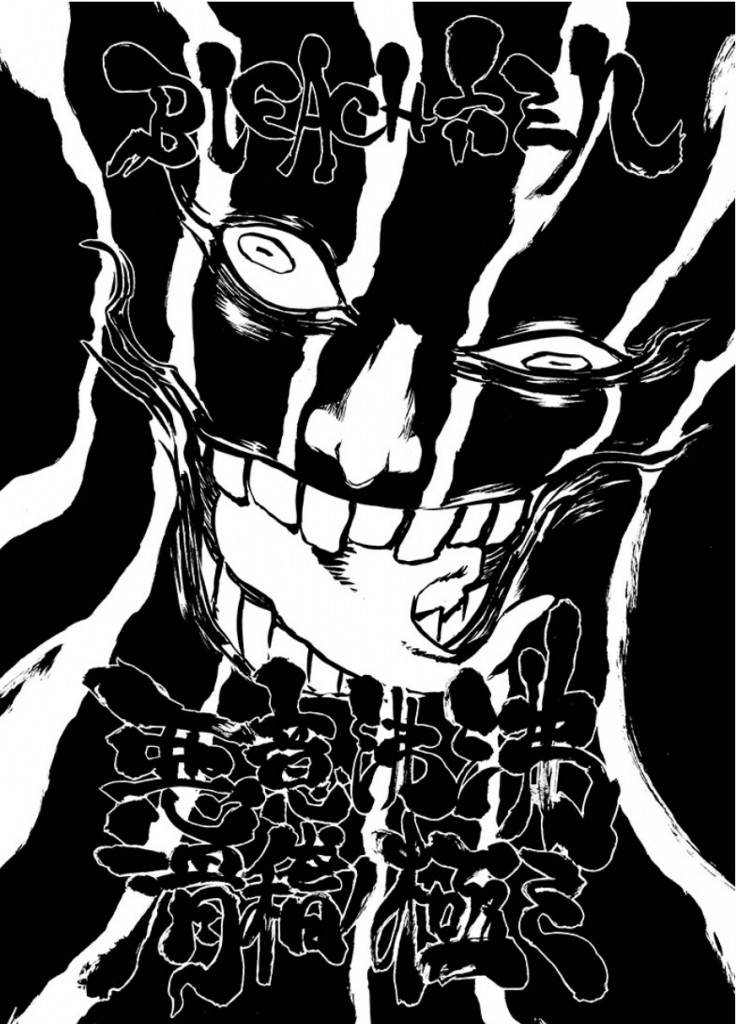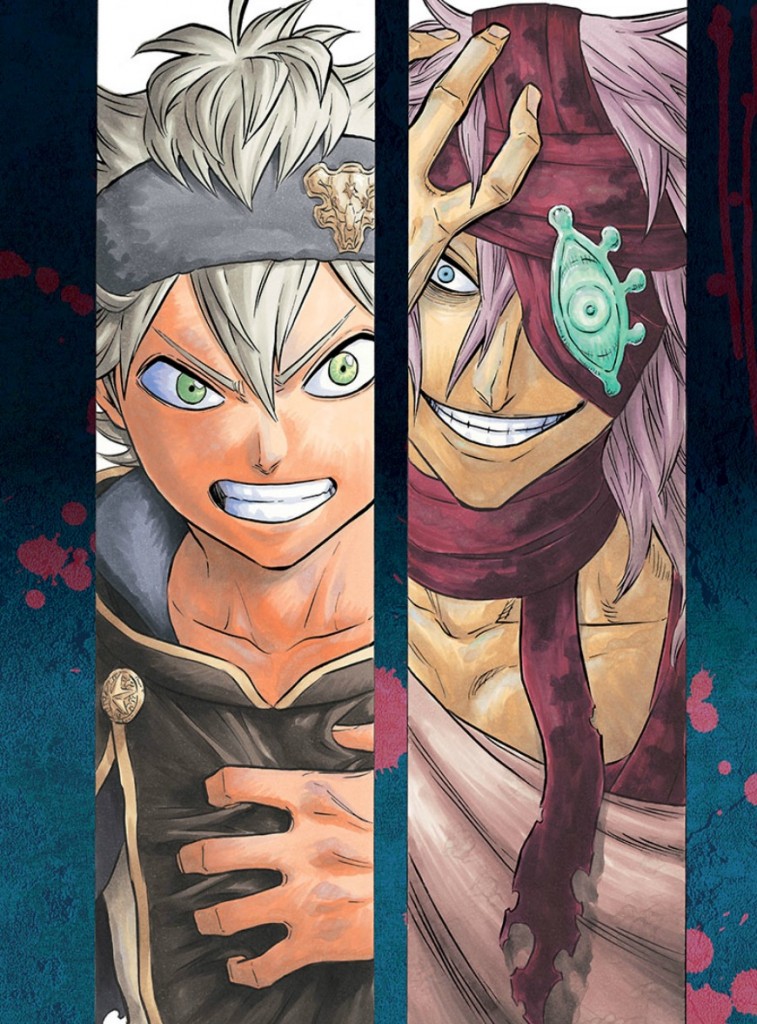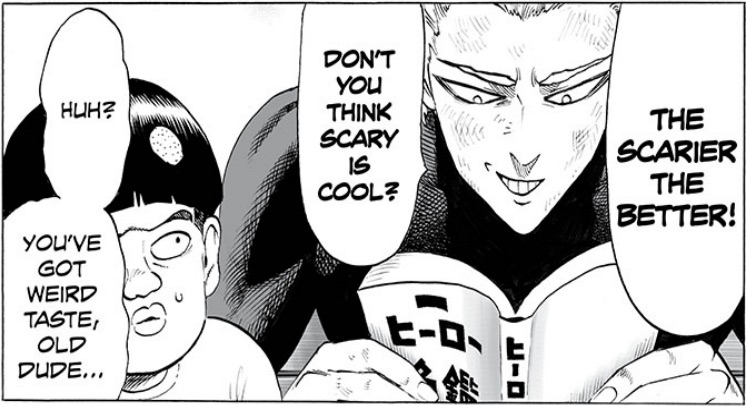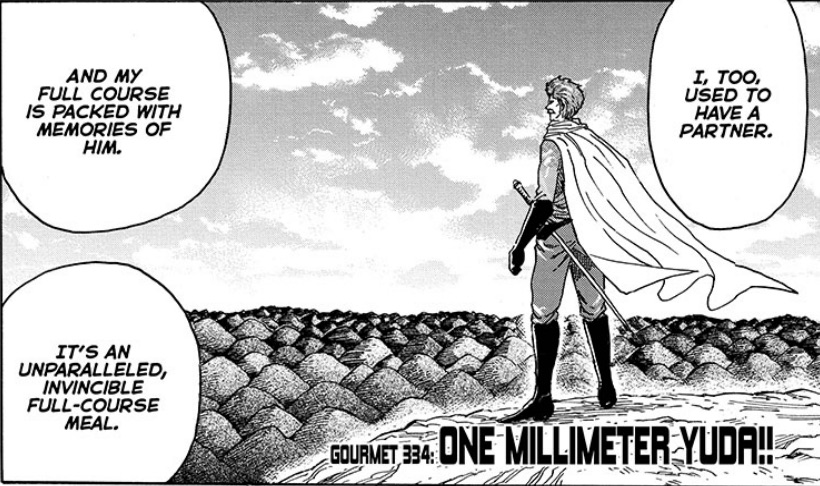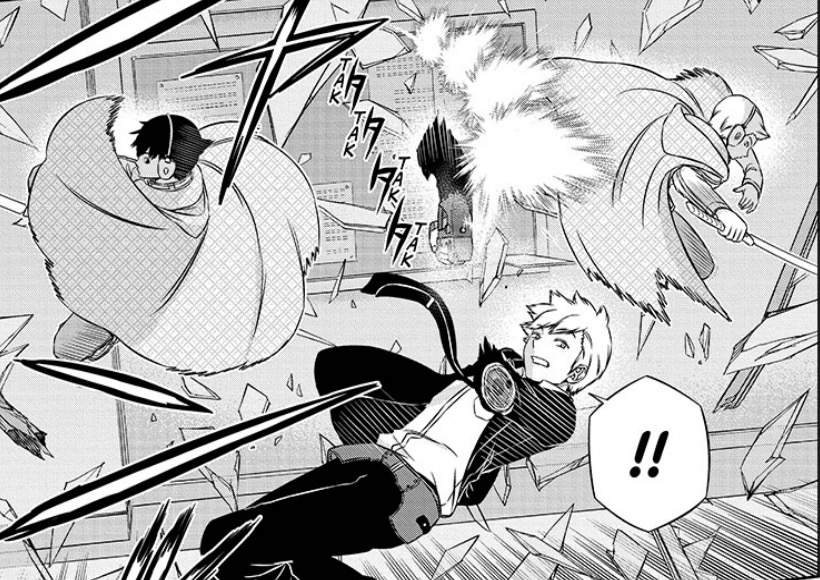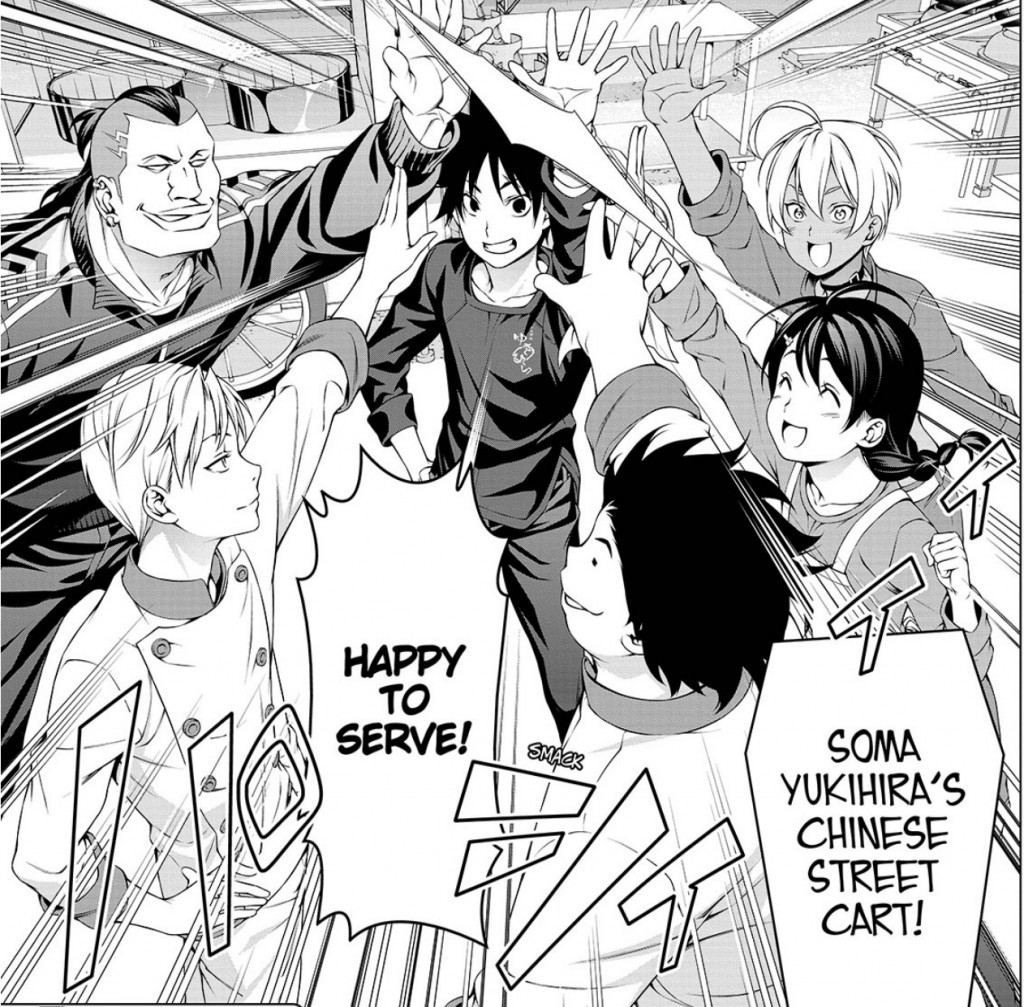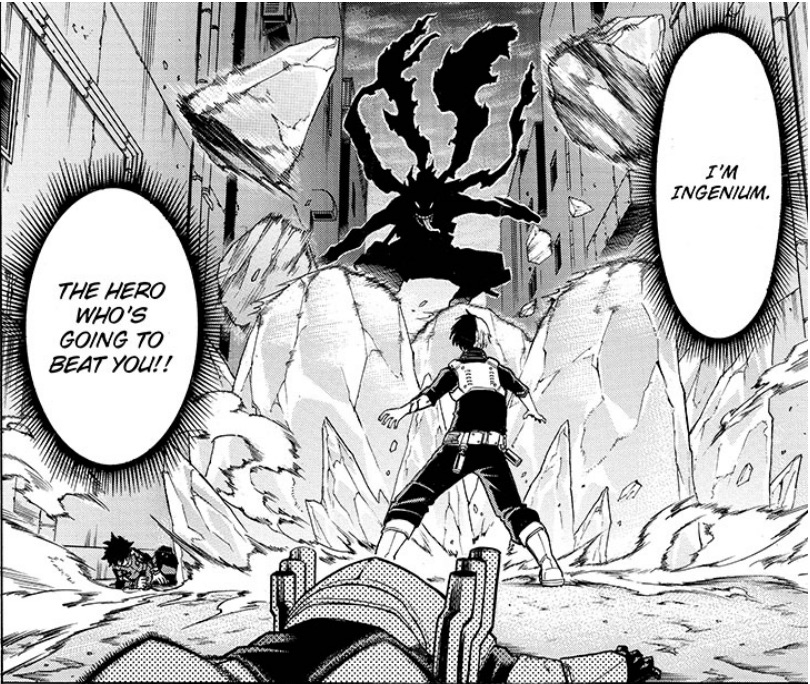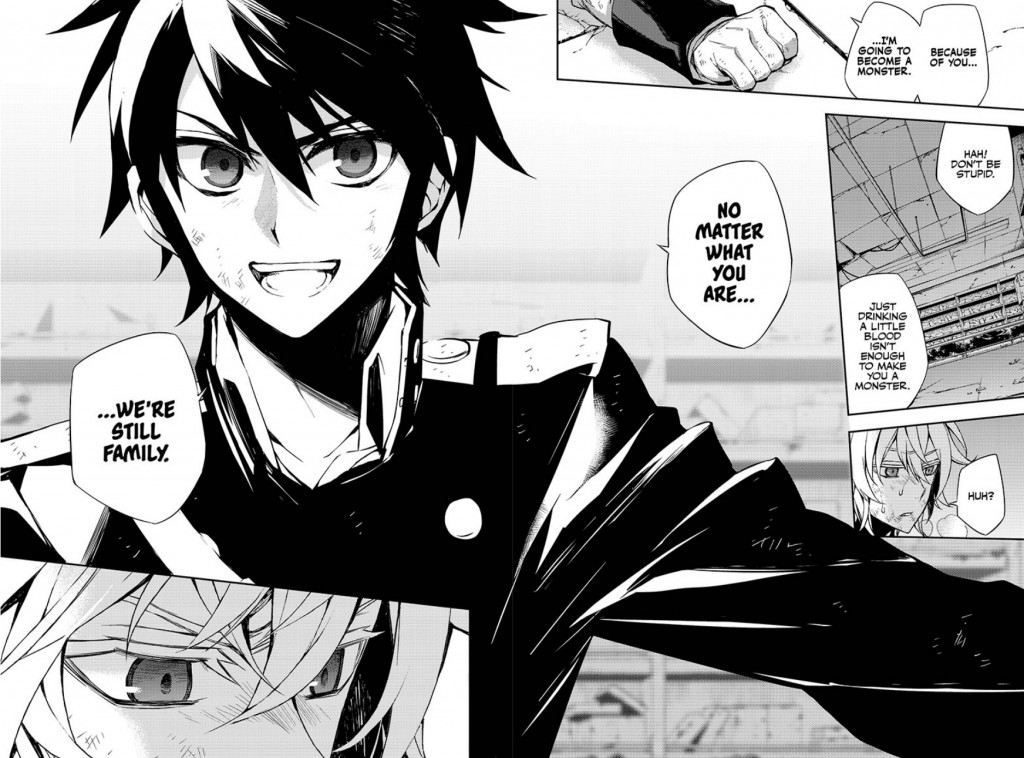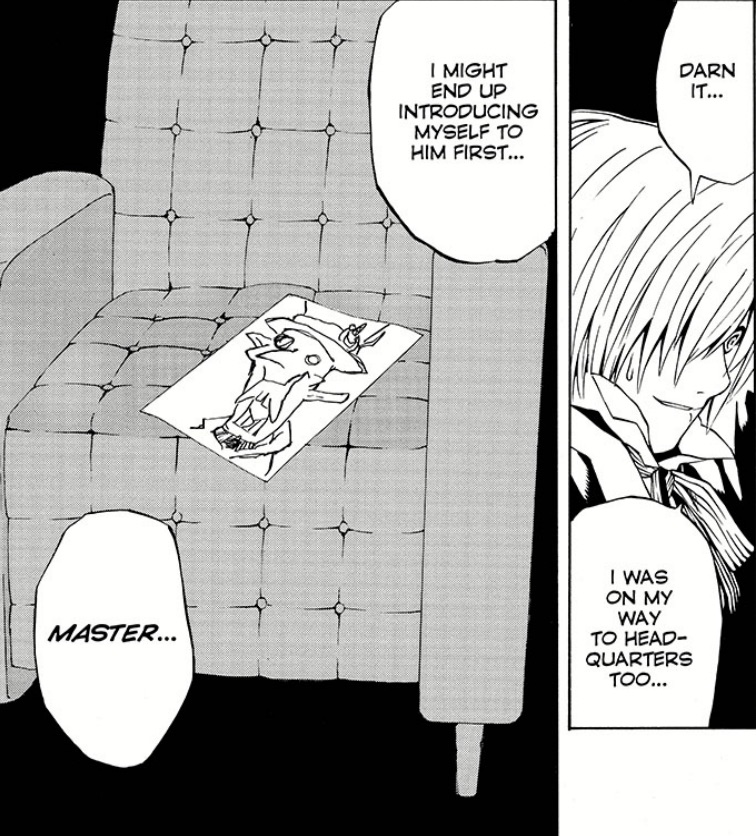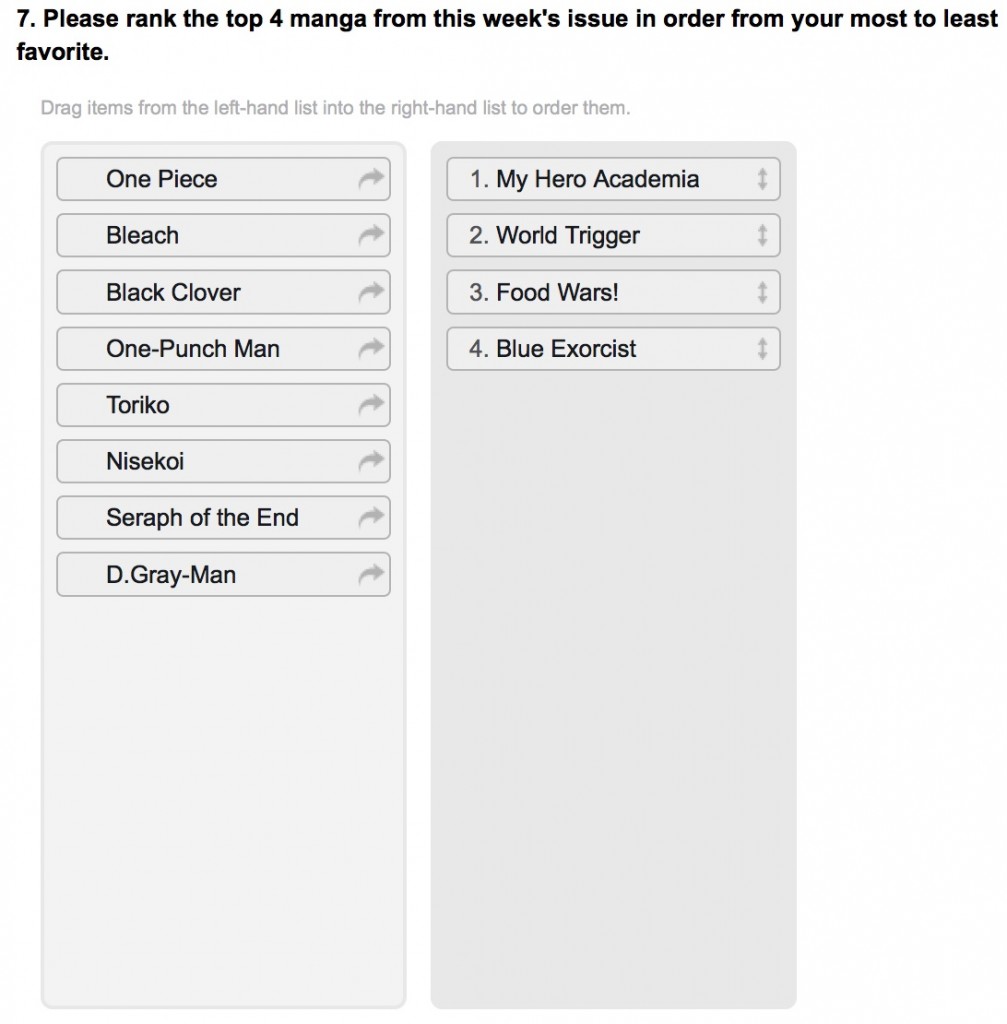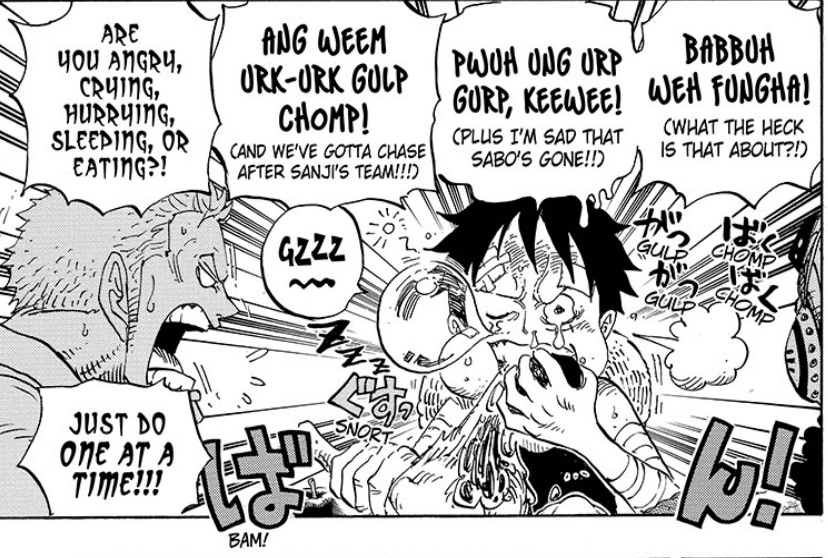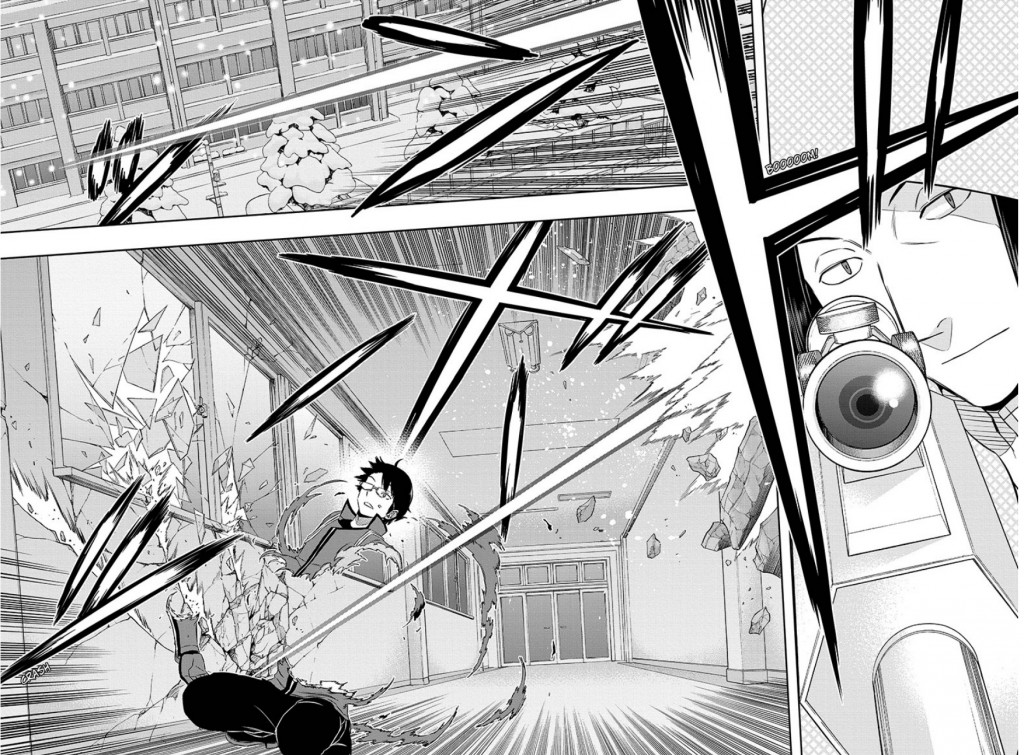08.21
I was not surprised by this announcement. Yu-Gi-Oh! has been a permanent fixture of the english Shonen Jump since the very beginning. Viz replacing ZeXal with Arc-V was a foregone conclusion. It’s the fact that we’re getting it before a Straighten Up! or Best Blue announcement, much less Assassination Classroom, that rather irks me. Sure, it isn’t like Arc-V is taking up a weekly spot; it’s only taking over ZeXal’s former place as a monthly series. But I really want to see those former series added in because of their potential and promise, and in AC’s case proven quality and popularity. Yes, there’s already 8 regular series in the magazine, but would one or two more really hurt that much? The spot left open by Gakkyu Hotei’s cancellation has yet to be filled, and I continue to be baffled every week why it’s taking them so long to replace it.
This week of Jump was another long one, and that combined with the fact I was on vacation for most of the week and I had a lot of work I needed to do for my internship is the reason this is up now instead of last Friday. Though, that’s not too much of an issue this time, since there will not be a new Jump this week because of the Obon Festival, which was a lucky break. Though writing these reviews take inordinate amounts of time, I quite enjoy writing them and comments I’ve gotten from people I’ve shared them with have been encouraging. I was hoping to get this out earlier and maybe do a bonus review this week if I had time, but I don’t think I’ll be able to now. But you never know, maybe I can get something extra out before Monday.
For now though I’ve got twelve series I need to plow through, so let’s get right to it. In this week of Jump, Yu tries to make his half-vampire brother turn into a monster against his will, Yukio gets existential, and Yuda has a sobering backstory about how he learned to treasure the value of a human life…and then he goes and kills a guy. …Huh. All this and more, After the Jump!
Weekly Shonen Jump: 2015, Issue No. 37/38
One Piece chapter #796 – “Soldier’s Conviction”
After the blast of excitement the series put out last week, this chapter feels like a big step down. It’s necessary, of course, since we do need to see closure on some of the subplots brought up in Dressrosa before we can move on to some new storylines. Unfortunately, the way the chapter plays out these events feels way too similar to what happened at the end of the Alabaster arc with only minute changes and variations. It’s not distracting enough to take away from some of the story told here, but it still rings as rather repetitive.
Sengoku’s appearance in this chapter was surprising, but it seems he’s taken his demotion pretty well. He’s a lot more relaxed and friendly, sort of like Garp, and with less responsibilities on his shoulder’s he’s able to take the time and see the humor in things and enjoy life a little more. It’s a bit weird that his hair has turned white only after being demoted, but maybe he just let out all his pent-up stress all at once and that physically affected him. One thing’s for sure – he really rocking that afro. Not sure if being made into a Vice Admiral is a demotion for Tsuru as well, but it’s interesting to see she’s still in a position of authority, moreso than Sengoku. The fact that it’s said that she escorted Sengoku to Dressrosa, however, indicates that he might have been brought there to fight with the Straw Hats. I doubt they could handle a fight against both Sengoku and Fujitora, but I’m still expecting them to get away by the seat of their pants like they’ve done in Alabasta and Enies Lobby, and I’m not expecting anyone to pull a Bon Clay to make that happen this time either. What’ll let them get away is probably going to end up being that Sengoku donated too much blood to Mansherry and gets woozy right at a critical moment. I’m calling it.
Considering his honorable and duty-driven character, I understand why Kyros felt the need to protect the prestige of the royal family of Dressrosa and prevent a scandal by keeping his identity as Rebecca’s father under wraps. And because of his unfavorable upbringing and criminal past, he feels she’d be better off not associating with him; he doesn’t think he’s worthy of being her father. He forgets that in Rebecca’s eyes, he’s been a pillar of support and strength for her; a loyal guardian that has always looked out for her and protected her in times of need. She may not have knew he was her father back then, but she loved him like one all the same. It doesn’t matter what past he has; that doesn’t define the person he is now, or affect what he means to her. He’s still her father, and she wants him to stay by her side like he always has.
Luffy gets this too, and he’s probably going to announce Rebecca’s true lineage to all of Dressrosa and tell her that she doesn’t need to be ashamed of her father, and that he in turn doesn’t need to be ashamed at himself. Whether that’ll make Kyros stay in Dressrosa or if he’ll stick with the Luffy/Law Pirate Alliance for a while remains to be seen. Personally, I feel that the character’s story has been developed thoroughly enough with not too much to expand upon, so while I like him, I wouldn’t be surprised or against him departing from the series here. Considering the way things seem to be set up in this chapter, I actually wouldn’t be surprised if the people of Dressrosa accept him as Riku’s next successor for the throne instead of Rebecca. That would feel a little convenient, but I could totally buy that happening with the way Oda’s written these characters’ stories in this arc. As if he’ll let Rebecca actually have to follow through on her responsibilities now that she’s got her daddy back, lol.
I feel like I’m coming across rather harsh on this chapter, when really, I actually rather enjoyed it. There are various bits of character interaction here that were fun and nice to see, from Sengoku donating his blood to Mansherry and Riku’s conversation with to Bartholomeo freaking out seeing five of his idols in one place and his leading role in the escape plan, and Bellamy’s irritation at having his life saved by Law, now having to deal with an annoying situation of being hounded by marines and having no master to serve when before he had found the perfect place to die. It’d be interesting if he ended up joining Law’s crew, considering Law himself was also a former subordinate of Doflamingo’s. Really, it’s just nice to see bits of development from all these various characters and hints at what role they’ll play as part of the Pirate Alliance and in future arcs. The story that connects all these little exchanges is something that doesn’t really interest me to much; I kind of feel like I know how the escape is going and what Luffy is planning to do. I like what we get in this chapter, but going through this right now feels more obligatory from the series rather than it does necessary, and that puts a damper on my enjoyment of it. As I’ve said before, I’m excited by the potential of the conflict with Kaido and the turmoil facing the Pirate Alliance, and I’d appreciate it if the series can finally break from Dressrosa and just move on to that. Of course, this arc only needs three more chapters until it’s 100 chapters long, and I have a feeling that Oda’s going to go for that, so I’m guessing that I’ll just have to bear with this stuff for at least another month. Eh, it is what it is, and so long as it can be fun to read like this chapter was, I can deal with it.
Blue Exorcist chapter #70 – “Ambition”
I still haven’t caught up with Blue Exorcist; I’ve only got 20 chapters in. Since every chapter is around 40 pages long, it takes a while to read the thing, and time I couldn’t allot. But I’ve read enough of the series to get a sense of the main characters and their motivations, and that allowed me to appreciate this chapter quite well even though I don’t know the full details of what’s going on. Unlike the anime version, Yukio isn’t a spawn of Satan like his older brother, but it seems that there’s something in his blood, and a fire in his eyes, that he can’t discern the origin of. He isn’t a demon, nor is he possessed by one, so he’s troubled by what this means in terms of who he is, and the consequences this power might have in the future. Yukio’s goal is to be a strong and reliable exorcist that can protect the people around him, especially his brother. The fact that he can’t control this power in his eyes willingly could prove detrimental to those around him in a tight situation. Yukio is not one to ask for help; he doesn’t want people to worry about him or burden them. So he’s taking it upon himself to study the power, figure out why it manifests, and see if he can control it. He’s already figured out in what circumstances the power is most likely to come out; when he experiences a deep fear, a fear for his life.
So Yukio decides to train by bringing himself to the brink of death multiple times until he can understand and appropriate the power. But as can be seen by his brooding attitude and cold slaughtering of lurking demons, it seems the real danger might not be the power itself, but Yukio’s obsession over it. He’s letting his self-doubts a about who he is and his ambition consume him, willing to risk his life repeatedly in pursuit of strength. Strength he hopes to use nobly, perhaps, but his mindset is nonetheless self-destructive, and a manner of thinking that could lead him down a dark path, his goals and morals eschewed, ultimately becoming the anti-thesis of what he wanted to be. This aspect of his story immediately reminds me of Ida’s character arc from recent MHA chapters, and while I feel the resolution of this subplot will be resolved in a similar manner to that, the steps there should be fairly different since the circumstances between the two aren’t the same, and the consequences this development may have in the future of the story and relationships between the characters, particularly Rin and Yukio, are intriguing.
This chapter isn’t ostensibly focused on Yukio’s subplot, however. Rather, it’s about Ryuji learning to accept that the goal he’s been working towards might be gone, but that he doesn’t need an ambition or goal to do the right thing. Ryuji’s entire motivation for becoming an exorcist was to avenge his family’s sullied name and restore his temple’s prestige by defeating Satan. However, so much time has passed that everyone has moved on, and his temple is no more. With the goal he has worked nearly his entire life towards no longer attainable, he’s conflicted about whether he still wants to be an exorcist, whether it’s still worth it for him. His life has been defined by his goal to restore his temple, and with that gone, he feels he needs something new to work toward, a new ambition, in order to continue on.
He confides this to Lewin because he feels that someone with his power and experience could tell him what he can do in order to move forward. He wanted him to share his dream, so as to inspire his own. Lewin, however, tells him quite simply that having an ambition is unnecessary. You don’t need an ambition to live life and do all sorts of daily tasks; those are things you just do because you want to. Similarly, Lewin doesn’t have a dark, brooding past and desire for vengeance, nor does he have a dream he’s pursuing, but that hasn’t stopped him from becoming an exorcist, and one of the best in the business at that. He just likes his work, and the results of his work, and is satisfied with that alone. He isn’t using his career as an exorcist to satisfy his own desires or even to save the world, necessarily, but because it’s something he’s good at and he knows he’s making a difference by doing so. There’s no big origin story for this guy, no specific reason he’s as strong as he is. He’s just a guy who happens to be good at what he does and likes what he does, and that’s all he needs to do it.
Lewin makes a great impression in this chapter with his chill and witty personality. He has a great sense of humor, very quickly impresses with how effortlessly and casually eliminates a horde of hobgobilns with a high-level spirit, as well as his friendly bluntless and relaxed, but confident attitude. Despite his status, he’s very down to earth and communicates his points to the students in terms they can understand very well. Simply put, he’s an excellent teacher and should be a great mentor for Ryuji, who presumably hopes to better himself by following Lewin’s example. Ryuji has defined himself by his goal, and by studying under Lewin, he wants to be able to understand himself, and grow as both a person and as an exorcist now that he has nothing deeper to motivate him.
This chapter provides a crisis of identity for both Ryuji and Yukio, and the way they deal with their problems. Without a purpose, Ryuji feels empty and directionless, and doesn’t know what to make of himself now that he hasn’t something to work towards. He reacts to this by reaching out to other for help, and to give him advice on what he should do. In doing so, he finds a perspective that challenges his belief in what he needs, and in becoming Lewin’s apprentice, he renews purpose to his life and starts moving on. Yukio, in contrast, feels like he’d burden others by telling them his problems; he thinks of what he’s going through as a nuisance, and himself as useless. He’s too prideful to confide his problems in someone else, and decides to deal with it himself. While he don’t yet know what answer he’ll find, we can see consequences to his personality already; he’s become darker, colder, and self-destructive. Both Ryuji and Yukio are, in some way, driven by their ambitions, both of which were to protect people they care about. Both used their ambition to push themselves along the path of the exorcist, and defined the people they became. Unlike Ryuji, Yukio’s ambition has become burdening to him, something he feels he must do alone, and his obsession with it is changing him in subtle ways he doesn’t yet recognize. And if he continues to keep his secrets and problems to himself, rather than working through his problems with people he can trust, he might find a way to control the fire in his eyes, but he’ll lose sight of why he wanted to do so in the first place.
Bleach chapter #638 – “Seething Malice the Height of Absurdity”
Mayuri casually mentioning Soken Ishida in this chapter when he replicates a Quincy technique just reminds me of how awful a person this guy is. Do you remember Soken? I assume most people don’t, but he was Uryu’s grandfather. Mayuri murdered him by sending a bunch of Hollows after him and preventing any Soul Reapers from coming to his aid, just so that he can study his soul. Soken was a kind man who used his powers to help others, and his example inspired Uryu to follow in his footsteps. Mayuri is a psychopath who kills and mutilates people to use as research subjects for twisted experiments. Somehow we’ve gotten to a point where we’re supposed to accept that Uryu is a villain, despite us never seeing him to anything villainous except for the fact he’s allied with Ywach, and we’re to consider Mayuri one of the good guys, when everything he’s ever done in the series has at best been selfish and at worst been horribly villainous. The things Mayuri’s done and said to have done in this series are far more evil than anything any of the actual villains in this series, Aizen included, have ever done.
So why should we care that Mayuri survives his fight with Pernida? He’s not fighting for the sake of the Soul Society, but so that he can make Pernida his test subject. Even if Pernida is a “bad guy,” that’s not an admirable goal that a normal human being with morals and ethics can or should get behind. Time and again, Kubo fails to give a reason for the readers to care about or like Mayuri other than the fact that he’s quirky and audacious and that’s apparently supposed to be funny. It’s not. Mayuri taunting Pernida about his name at the beginning of the chapter, and telling him he’s just a test subject and he’ll allow him to name himself but he’ll decide the spelling isn’t funny, it’s sick. Even if Pernida is a giant fucking hand, it’s still a sentient creature with feelings and emotions. Mayuri has no right to essentially enslave it, and he doesn’t want to study Pernida to help others; he’ll basically treat it as a living toy for him to hack up as he pleases. That’s awful. Mayuri is an awful character. This is an awful chapter.
The best I can say about this chapter is that I like Pernida’s ability of using it’s nerves to shape the ground into giant hands and attack Mayrui. There is some choice action in this that is rather cool. It’s a bit interesting that Pernida’s fingers can somehow gain sentience when they’re detached from it. But again, there is nothing to get invested in here. There’s no one to root for in this fight, and the point to it remains to be seen. Instead, there’s a lot of infuriating aspects to it derived from Mayuri’s terrible, always one step ahead character, and the awful comedy Kubo tries to do with him. Every chapter with Mayuri as the focus feels uncomfortable and surreal, and while in some ways it’s a refreshing detour from the other inanity in Bleach‘s story, it’s still not fun to read in the slightest. Like Mayuri, modern Bleach lacks any soul or heart, and I don’t know why I should care about it when it consistently gives me nothing to care about.
Black Clover chapter #25 – “March of the Dead”
I like what this chapter is going for, and as usual with the series I quite appreciated a lot of the imagery in this chapter. The beginning few pages especially, showing the Necromancer attack and slaughter several guards with his zombies, has a lot of disturbing elements to it, and Asta’s charge through the zombies in that two-page spread at the end of the chapter is extremely cool. In general, I also like the Necromancer’s unhinged, crazy personality, which while over-the-top, is the kind of fun over-the-top that’s infectious in a battle-shonen villain, and that scene where he asks a little girl a leading question and then proceeds to wildy rant at her was enjoyably ludicrous. It’s unfortunate, though, that his character and this plot development feels so shallow. There was no set-up to this guy showing up before last chapter, and we still don’t learn anything about who he is and why he’s doing what he’s doing in this one. I mean, yeah, he hates the Kingdom because people ignored him or some shit, fine, but we still don’t know why that is. I’m not asking for a full backstory for this guy just two chapter in, but I’m asking for a reason to care about him as a threat. In MHA, Stain’s attack on Ingenium was built up through multiple chapters; we learned about him and saw him in action long before the protagonists were forced to fight him. This guy didn’t need as much build-up with Stain, especially since I’m sure he won’t be as important in the grand scheme of things, but something as big as a Necromancer attacking the capital city should have been given more foreshadowing, and this character more build up to show exactly why he’s so dangerous and a credible threat.
As it stands, I don’t really grasp the danger Asta’s facing in going up against the guy. Sure, he’s got a zombie hoarde, but Asta blasted through a bunch of those pretty easily, so who’s to say he can’t take him on all by himself? There isn’t enough tension to this conflict, and it’s hard to really get invested in it because of that. Instead, it’s easier to observe that the purpose of this character and his zombies are just to show off all the new rival characters and their abilities, and build them up. I get the purpose of these events of the narrative in a distant sense, but I don’t care about them in the personal. Similarly, I still don’t know what to make of Leo’s sudden rivalry with Asta because I don’t really know who Leo is as a person or character, and I don’t really care about Charmy will do in this arc because all I know about her is that she really likes food. The series needs to do a better job of establishing it’s secondary characters and developing them in a way so that the audience can be invested in them before they are flung into situations where we’re supposed to feel concerned for them.
This isn’t a bad chapter, but I don’t think it’s a very effective one either. It doesn’t give me a legitimate reason to find the fight with the Necromancer interesting outside of some personal, shallow reasons like liking his craziness and some of the morbid imagery in the chapter, and I don’t really care how Asta and the rest of the knights will beat him because I don’t understand how much of a threat he actually posses and how he compares in strength and ability to Asta himself. There’s a lot of good ideas in this chapter, as there are in this series in general. But as has been a consistent weakness of BC so far, the execution here feels misguided and lacking, and strong artwork and pacing can’t make up for a storyline that doesn’t quite work. Maybe this can be rectified as this arc goes on, but I feel that in the end this fight will serve it’s purpose in the overall story and only that, weightless and forgettable in the long run. And when you’re having your characters go up against freakin’ zombies, that’s the last thing it should be.
One-Punch Man chapter #48 – “I’ve Got Free Time, So…”
Garo claims he’s a monster, and he is in terms of both his strength and ambitions. However, he isn’t a pure monster; there is humanity to him. As demonstrated in his conversation with the little kid, he has a childish fascination with monsters, and though their interests don’t align, the shared interest both he and the little kid have for the topic of heroes allows them to bond. Garo befriends the kid. He shows very human interests in socializing and talking about what he likes with other people. In some respect, Garo’s idolization of monsters is no different than any kid’s idolization of heroes. His backstory is in many respect a variation on a typical “kid inspired to become a hero by watching heroes in action” story, like Midoriya in MHA, just switching out heroes for monsters. Yes, Garo is strong, but it’s not that strength that makes him so dangerous, and what really makes him a monster. It’s the very fact that he’s also human that makes him dangerous; he knows how human beings tick, and unlike a normal monster blindly rampaging and causing destruction, he very specifically and carefully targets and takes down heroes. Garo and MHA’s Stain share this parallel; they are both killers that specialize in killing heroes, and do so because they want to correct an injustice. Garo has less idealistic motives than Stain does, but like him, the sense of purpose in what he does, and the human emotions and desires that drive him, are what make him a true monster, and a more dangerous threat to both heroes and human society than a biological monster like the Sea King could ever be.
Whether he’s actually a threat to Saitama is questionable, of course. Saitama seems excited by the possibility of facing a strong opponent, but as strong as Garo is, it’s doubtful he’d be able to push the titular one punch man more than Boros did. For the moment, Saitama seems to want to satisfy his itch for a good fight, which he might find entering the martial arts tournament in Charanko’s place. Though, it seems that his desire to win the reward money overrules his interest in finding a prospective rival. A tournament in OPM with Saitama involved will be quite interesting to see, especially if Garo somehow ends up involved in it too. How these plotlines converge, and the inevitable meeting between Saitama and Garo occurs remains to be seen, but this story arc continues to move in an interesting direction that I’m keen on seeing explored.
Toriko chapter #334 – “One Millimeter Yuda!!”
A big concern I’ve had regarding the series focusing on a group of secondary characters in this cooking competition is their lack of development compared to the main cast, making it harder to invest in them and the contest as a whole. This chapter presents a way for the series to get around that, by using these matches as means to reveal more about these characters, their motivations, and set them up as important players in the future of the story. And the story given to Yuda here is just excellent. Within just a few pages, we learn his past, how his life experiences have shaped him as a cook and as a person, and how he’s applied the lessons he’s learned to his cooking and having him apply them to how he wins his battle with Condor. His story shows him learning how being careful and precise makes a difference, how fragile a human life is and how to value even the simplest things in life, because those simple things often matter the most. His story is compelling, characterizes him very well, and gives us a better understanding of who he is than we had going into this fight.
Unfortunately, the series undermines his story by not having Yuda show off how his precision makes a difference in his cooking, but rather having him basically cheat and send his opponent falling to his death so he can have more time to prepare his dish. I like the concept of the balance scale match; it’s a cool gimmick that could have made for some interesting tension with a back and forth kind of match, and in another situation it would have been a lot of fun to see implemented. But it just doesn’t fit here; the rules of it work counter to how Yuda’s style of cooking operates. And while that could have been used to put more pressure on Yuda if his opponent cooked the same way as him, Condor’s style of cooking is too fast and immediately puts Yuda in a losing position, so the only option the series has for Yuda to win the match is to basically incapacitate Condor through external means. After a backstory about Yuda learning to value life, it feels like a tonal disconnect to have him pretty much murder his opponent. While I’m sure the next chapter will reveal that Yuda sliced the gravity barrier in a way that protected Condor from the furnace somehow and he’s not actually dead, it’s unsatisfying and counter-productive to building up the character to have him not win because he’s the better chef, but because he stopped his opponent from even competing with him. Sure, circumstances basically forced him to, and he has more of an obligation to help his team win than he does to his opponent’s safety, but Condor, while a jerk, wasn’t a bad person, and it feels wrong that Yuda doesn’t seem to bat an eye about sending the man to a fiery death.
It’s hard for me to get too upset at the chapter, because I really do think Yuda’s story is really effective, and honestly did think his final speech to Condor while he drops to his doom was a bit badass. But the execution of it as a whole just doesn’t sit right with me, and that’s especially disappointing to me because I was really excited to finally see a real cooking competition in Toriko, not a match where a protagonist only wins because he takes out his opponent first. I’m fine with having the matches rest on gimmicky obstacles and stuff like that, but only if they compliment the story of the protagonist involved and add to the tension in a meaningful way, and not detract and inhibit it like was done here. I hope the remaining matches prove better constructed, because as it stands, I felt Yuda’s match with Condor was a wasted opportunity, and a rather unsatisfying beginning to a subplot I felt had a lot of potential.
World Trigger chapter #112 – “Haruki Azuma: Part 2”
I wasn’t expecting Osamu’s training to suddenly make him on par with the other competitors. On the contrary. He’s only had a few weeks of training at best, and he’s up against opponents who have years of experience over him. It would have cheapened his character and his arc if he was suddenly on their level after just a few crash-course training sessions. Of course, I was expecting him to put up a little more of a fight and contribute something to his team’s victory in this battle. Never did I expect he’d the first to bail out.
But really, that makes perfect sense. Of course he would be the first to go; he’s the weakest one there, and his opponents know how to exploit his weaknesses and are more used to close combat than Osamu is. To hit the point home, the only person who’s surprised that Osamu was defeated is Chika; Arashiyama, Kitora, and even Yuma and Jin of all people aren’t fazed by it at all. Even earlier, when Azuma squad and Ninomiya squad engaged each other in a two-on-two, they all ignored Osamu completely; no one saw him as a threat at all. It sucks, but it really feels that no one was expecting much from him in this match, and that’s not a condemnation of Osamu as a person, but a harsh reflection of how much lower his ability and capabilities are compared to those his better.
Osamu’s loss in the match can be attributed to not relying on his own strengths as a tactician and focusing too much on getting points in a close-combat situation. That wasn’t his area, and while improving his ability to get hits off his opponent was a worthy endeavor, he still was only a mediocre fighter at best. Remember, his record in his training was 1 win out of every 4. There was a way higher chance he’d lose in a direct fight than he would have won, but he continued to pursue that option stubbornly. In the end, he was completely on the defensive the entire time in his fight with Inukai, and as soon as he dropped his guard, he was immediately picked off by Azuma. Osamu needed to play this match a lot safer, and focus on tactical strategy over direct combat, but he overestimated what he was capable of, nor recognized his vulnerability, and ultimately, his negligence to caution cost him the game.
Whether Tamakoma can still win this match remains to be seen, but I’m expecting that they’re do for a loss. While I’m sure we’ll see that both Yuma and Chika have improved themselves since the semi-finals in their own ways, like Osamu, I expect that won’t be enough for them to pull off a victory against opponents with years more experience. Nonetheless, I’m keen on seeing how Yuma’s fight with Kagegura plays out, Chika’s role in this match now that Osamu’s out, and which team will ultimately turn the tide in the battle. If Tamakoma does lose, that begs the question of whether Jin predicted that, and his deal with Hyuse to give him back his Trigger is something that would end up being to his benefit. Unfortunately, we won’t get to follow up on any of this until the issue after next, which is a bummer. Chapters like this show the series at it’s most inventive and unpredictable, and are a promising sign of even greater things to come as the final match of the Rank Wars continues on.
Nisekoi chapter #181 – “Limit”
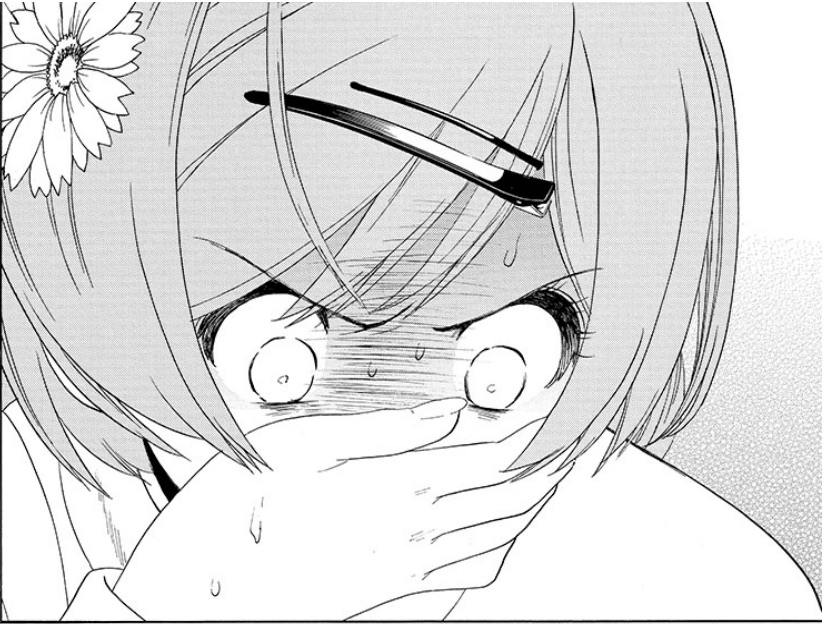
Out of all the characters in Nisekoi, Marika has always been the most blunt about her feelings. She didn’t hide how she felt, or what she felt, and had always tried sincerely and earnestly to get Raku to give her the time of day. It’s a unique character analysis for someone of this archetype; she’s so proactive and open with her feelings because, in a way, she’s the most true to herself. She understands herself better than anyone else in the series does about themselves. Only now does Raku get that. He realizes that her feelings shouldn’t be ignored, and that he can’t use his false relationship with Chitoge as a crutch to constantly wave her away. He needs to clearly and firmly lay down how he feels about her, and make her understand that a relationship between them just isn’t meant to be. For someone who genuinely, sincerely loves him with all her heart and soul, and for someone he truly considers a friend, it’s the only right thing to do. If the consequence of it means that they can’t be around each other, then he’ll have to live with that. It’s time for both of them to move on.
It’s a little frustrating that we have to delay that confession for a while yet, but Marika’s story arc with her mother shows a lot of promise. It seems that Marika isn’t dying from an illness, but rather, suffers from anemia. Of course, Honda could be obscuring the truth, but it’s clear that whatever ails Marika, it’s been exacerbated by stress and her lifestyle. Living on her own is becoming too much for her to handle, and she needs to be in the company of family members who can be there for he in case her symptoms worsen and she needs immediate treatment. Marika’s desperation to get Raku to commit to a relationship with her was likely driven by the inevitably of her being sent home for treatment and kept there by her family for the rest of her high school years. By the time she could see Raku again, he might have already committed to a relationship with someone else, and she might not have had another opportunity to be with him.
This is all speculation, of course, but I think it’s in-line with what we’ve seen from Marika in the past few chapters. There’s also the added family problems, specifically her contention with her mother, that also factors into her reluctance to return home. The fact that Honda states Raku and the rest wouldn’t see Marika again implies that her mother might try to confine her to home or a hospital, or otherwise arrange a marriage for her and otherwise control her life the way she wants, as opposed to giving Marika autonomy. If that’s the case, it would certainly explain Marika’s bitterness towards her mother, and explain her carefree and blunt nature as a way of rebelling against the strict lifestyle she’s led for years, and embracing an ephemeral freedom that she knows could be taken away from her at any moment. That might be too bold and preemptive an analysis for the moment, but I feel the direction the story is leaning towards it.
The next chapter will be an interesting one, that’s for sure. No doubt it’ll feature Mikage elaborating on Marika’s family background and circumstances, expanding both the characters’ and our understanding of her situation. Whether this leads to a rescue-style arc for her or something else remains to be seen, but as someone who’s spent most of his time reading Nisekoi not being particularly fond of Marika, I think she’s quickly become one of the most interesting and compelling in the entire series, and I can’t wait to see where her story goes next.
Food Wars! Shokugeki no Soma chapter #130 – “A Pride of Young Lions”
This chapter provides a wonderful demonstration of how each of the characters involved has grown since the Fall Classic. Mimasaka has opened up to collaborative cooking and in the process taken his tracing cooking style to a new level. Tadokoro has taken the service skills she’s honed to heart and uses them to keep customers satisfied to the best of her ability. In the process, she’s become more outgoing and comfortable around people, quickly able to understand their needs and make them feel at ease with a newfound confidence in her self and her abilities. No longer does she easily feel stressed under pressure, but is able to keep a level head and prioritize what’s important and what needs to be done in order to finish the job. Nikumi has become able to better recognize when a meat dish is best prepared from the experience of listening to sounds and paying attention to specific details and patterns, making her even more efficient than before. Finally, Takumi has made a comeback since his loss to Mimasaka, and better rounded himself as a cook to adapt to dishes outside his signature Italian cooking, and is now more confident in himself than before, finally rivaling Soma as an equal again. While each character only gets a brief moment to themselves, the chapter nonetheless provides a great showcase of their growth and development, and how their rivalries with each other have made them mature both as people and as chefs.
But I think the most brilliant thing about the chapter is that, essentially, Soma outdoes Kuga’s connections with those of his own. Kuga’s got sponsors, vast resources, a years-built reputation, and a whole crew of skilled chefs on his side, none of which Soma has. What he does have, though, is people who believe in him, and will come to his aid in his time of need, and that was enough to make a difference. Essentially, Soma won with the power of friendship, but the chapter doesn’t present it in such saccharine terms. It feels a lot more natural and believable; Soma’s built relationships with these people over a long period in time, and he owes a lot of his development to them and they to him, and trusts in them as vice-versa. This is a tight-nit group of peers and rivals who are competing with each other to get to the top, but still will band together to help each other take down even bigger obstacles on the way to the top. Everyone coming together in the chapter makes the payoff both a great moment of camaraderie and a testament to what can be accomplished when great minds with different skill sets band together to make something bigger than themselves.
Of course, let’s not sell Soma’s individual efforts short here. While there was a lot of factors to his victory that came from luck, he still carefully evaluated his opponent and evolved his booth deliberately, slowly perfecting it and building it up across the entire duration of the Culture Festival. Kuga recognizes this, and realizes that Soma isn’t just a promising cook, but a damn smart one who’ll continue to grow, and whose ambition and challenge can’t be ignored. Kuga’s finally gotten angry enough to give Soma exactly what he wants; a shokugeki with his seat on the council on the line. Whether Soma wins and moves closer to the top or loses and has ambitions squashed is up in the air, but with that much on the line, I’m certainly expecting it to live up to the ferocity a clash of lions would suggest.
My Hero Academia chapter #54 – “Re-Ingenium”
Looks like Todoroki’s words have woke Ida up just like I thought they would. He recognizes how narrow-minded he’s been and how his feverish desire for revenge has made him lose sight of what makes a hero, and the kind of hero Ingenium was and he wanted to be. Ingenium’s motivation seems a lot similar to Lewin’s from this chapter of BE; he doesn’t have a grim backstory or a dream driving him, but he believes in the value of the work, and thinks using his powers to help people is the right thing to do. He may not have been a perfect human being; obviously, we only see him through Ida’s eyes in the chapter, and don’t know him throughly as a person. But his intentions in being a hero were noble and selfless; he didn’t want to use his powers to save the world or be a champion of justice, necessarily, but to help people who need it.
Ida wasn’t helping anyone but himself through his crusade against Stain. On the contrary, he was ignoring the plight of people he should’ve been helping, put himself at risk, and dragged his friends into danger as a consequence. His cause wasn’t noble, it was selfish, and he lost sight of what exactly he admired in Ingenium as a hero and role model as a consequence. Ida might not naturally think and act the same way Midoriya and Todoroki do in a situation, and has a ways to go before he can meet the standards he set for himself, but he’s recognized that he needs to change. He shouldn’t be a hero for the sake of following his brother’s footsteps, but because he wants to be one; someone who helps people because it’s right thing to do, and not because he has something to prove.
So Ida takes responsibility for dragging his friends into a battle with Stain by standing up and taking him head on once again. Stain’s words won’t deter him. He doesn’t deny his claims, but he won’t let them distract him from the values he’s upheld from his brother’s example. Ingenium may not have been infallible or invincible, but he still serves as his inspiration, and Ida’s ideal image of a hero. Now it’s time for him to try and live up to that image once again, but in his own way, and on his own terms.
The action in this chapter is just pitch-perfect; visceral and intense, selling both the desperate moments and the triumphant ones with beautifully raw imagery. The highlight definitely being the sequence at the chapters’ conclusion, where Todoroki freezes the regulator on Ida’s leg, Ida pulls a knife stabbed through his arm with his teeth, and he and Midoriya proceed to hit Stain simultaneously with a kick to the gut and a punch to the face. It closes the chapter, and presumably the battle, off on a high note, delivering complete satisfaction to Ida’s character arc and the clash of philosophies between the heroes and Stain. I don’t know what’s next for the characters, but I think it’s safe to say that Stain’s role in this story isn’t done just yet. Todoroki notes that he’s a deliberate, smart killer who relies on tactics rather than sheer power and quirk to get the job done, with a tenacity and drive to win that makes him more dangerous than your run of the mill murderer. Stain’s clearly being set up for a bigger role in the ongoing story past this, perhaps as a recurring anti-villain, or maybe even a recurring anti-hero after maybe a redemptive arc. Who knows what’s in store for the character, but so long as the series keeps the kick-ass momentum it’s had these past few weeks, I just know I’ll enjoy the ride.
Seraph of the End chapter #36 – “Yu & Mika”
…Bullshit.
No, seriously, that’s fucking bullshit. What kind of saccharine, idealized logic is that? This might be a shonen series, but good lord, this defies all matter of common sense. Mika tried to attack Yu earlier in his vampiric bloodlust-induced rage. How does he not get that once Mika acquires the taste for human blood, he might not retain the sense of humanity he’s only barely clinging to right now, and become a monstrous, murderous sociopath who sees humans as fodder like the rest of the vampires he’s been up against? Mika’s even telling him that it’s a bad idea, that he won’t be the same again and there’s no going back once he steps over the line. But no, Yu thinks that friendship and family will conquer all. Yeah, that’s a smart way to live. Love and family will conquer all just like how it helped your entire orphanage clique esca-oh wait, no, they were all slaughtered except for you and Mika. Remember that? Maybe the world doesn’t work in such a convenient way.
I mean, for fuck’s sake, Yu doesn’t even take Mika’s pain and torment seriously; well, neither does the series, it seems. The entire discussion between them is undermined by poor and misplaced attempts at humor that make light of Mika’s soul-crushing moral conflict between saving his life at the cost of his humanity, and his choice to not drink blood, not become a monster, for all these years enduring intense and violent physical and emotional pain, just so he can reunite with Yu. Yu basically ignores everything Mika says except for the fact that he won’t die if he drinks human blood, and then proceeds to call him an idiot and tells him to suck it up and become a monster so he won’t cry. He basically says to forgo everything he’s worked years for; that his personal sacrifice and his suffering was meaningless. He refuses to listen to potentially important information and basically tempts and forces him to give in to his urges and drink his blood. The series presents this as the right thing to do and Yu as in the right. He’s not. That was a stupid and risky thing to do with potentially dangerous ramifications. I’m sure it will all work out because shonen, but wholly shit, the tonal disconnect between the depiction of Mika’s struggle and the resolution is one of the most baffling and infuriating things I’ve read in a while.
Yu just continues to be an awfully constructed protagonist. If the way he deals with Mika’s problem wasn’t enough to illustrate that, the conversation he has with Asuramaru hammers it home. His dialogue is so vapid and his way of thinking so stereotypically shonen action hero; unfazed by anything, overconfident in himself, and spouting typical jargon about how friends are great, how he’ll protect his friends, how he wants to be with his friends, blah blah blah. Yu’s entire character is just defined by how shonen his outlook on life seems to be, but the series presents that as the right philosophy to have in a post-apocolyptic war with vampires that have enslaved humanity and use them as cattle. I liked him better back when he was an asshole; he still was a terrible character, but at least he fit the tone of the world and the series better. I don’t know how a guy like this could survive and think the way he does based on his experiences and environment; it’s not believable in the slightest, and that just adds to my irritation. I feel that this chapter was intended to be a big, emotional turning point for the series, but the series’ inability to balance the tone it’s going for, and it’s absolutely baffling logic and poor character writing, make it fall completely flat. Maybe the series will show that Yu’s decision was wrong and he gets fucked over in the next chapter for being so stupid, but considering Seraph‘s track record, I doubt we’ll see much if any consequences pop up as a result of this, at least not any that won’t just be effortlessly brushed away later.
D. Gray-Man chapter #2 – “A Full Moon Night”
My memory of early DGM must lean more towards what I recall from the anime, because I seemed to forget that Allen’s backstory chapters happened sooner in the manga than they did there. Next week’s chapter will actually be the first chapter I ever read of the series, and my first exposure to it as well. That, combined with this week’s, would have made for a way better pilot chapter than the one we were given. Really, this chapter repeats basically all valuable information the first chapter told us about the world, the main character, and the plot, and does it in a more natural-feeling way, and with a less stupid story to tell them with. Not to say John’s story is remarkable, necessarily, but he has more of a character, a more interesting relationship to his friend, which makes the revelation that he’s an akuma hit harder. His story also doesn’t rely on forced and unbelievable drama and character’s making stupid decisions like that nun akuma story did, which is a definite plus. Allen also comes across as a much better character here; we’re given a better sense of his personality, introduced to his relationship with his master, more hints as to his tragic backstory, and he’s given a more personal investment to John’s story than he did with the last character-of-the-week.
I find I don’t have much to say about this chapter, except that it was what the pilot chapter was trying to do done much better, and done in a way that feels less like a rip-off of other manga and a bit more unique. There’s much more personality in the character interactions, the humor, and the pacing of the story, and while a basic plot to do with this premise, it’s executed effectively. My only complaint might be that the Earl’s first appearance isn’t really given much build-up and doesn’t feel like a big enough moment, but the series does still get to the jist of his personality and threatening nature before the chapter leaves off. Part of the reason why I don’t find much to say about this is that I went over a lot about what works and doesn’t work about early DGM last week, and this chapter just feels like a retry of what the pilot chapter for this series should’ve been. Next week, though, we’ll learn a lot more about the world of DGM and Allen’s past and character, which should offer a lot more of substance to analyze.
Final Thoughts:
There was some amazing chapters in this issue, but there were also a lot of mediocre, and a couple bad ones. I think what’s ultimately unsatisfying for me about the issue is those mediocre chapters, because they really could have been so much better. OP could have just gotten through all this obligatory stuff with Kyros and Rebecca in one chapter and we could’ve focused on the more interesting plotlines awaiting us. Toriko had such a good thing going with Yuda’s backstory and the cooking competition, but then undermined the character’s development and the message of the chapter with a tonally dissonant ending. Black Clover continues to have cool ideas and concepts, but didn’t give enough character and weight behind it’s plot development for me to really get into it. One-Punch Man was solidly written, but felt more like a transitional chapter and was a little unsatisfying as a consequence. I’d call them all good chapters, mostly effective in what they were trying to do, but they felt a little disappointing to me, especially in comparison to the top class of the issue.
But as for themes, family and friends were the name of the game this time. Most of the chapters involved characters facing issues stemming from their relationships to their family, from Ryuji trying to figure out what to do with his life now that he can’t bring them back together, Ida reevaluating his relationship with his brother and why he inspired him, Marika being called back home because of her mother’s orders, to Yu guilt-tripping Mika to become a blood-sucking monster because he’ll make him cry if he doesn’t. On the friends side, we saw Soma’s come to his aid to help him take down Kuga, Ida getting back into the fight with Stain to protect his friends, the pirates Luffy’s allied with in the Dressrosa arc repaying their debt for him defeating Doflamingo by helping him escape, and Yuda learning to appreciate the value of a human life when someone he cares about dies because of a simple mistake he made. There was also a lot about learning from your mistakes and growing from them in the issue, with Ida, Yuda, and most of the Soma gang showing how they’ve taken their former weaknesses to heart and have become better people because of it.
As a whole, this was a good issue, but some of the less satisfying chapters here and the awfulness that were those Bleach and Seraph chapters bring it down a bit compared to the previous few weeks. Hopefully the next issue sees everything back at the top of their game, because boy howdy, there sure is a lot to look forward to in a whole lot of them.
Best Manga of the Week:
1. My Hero Academia – Both MHA and Food Wars! had extremely satisfying climaxes to their arcs, but ultimately, I found the way Ida’s character arc was resolved and the epic combo attack on Stain to put it over the edge as my chapter of the week. The series has had so much great character, intensity, and action in these last few weeks, and the fact that the series somehow continues to push it’s level of excellence higher and higher each week with unrelenting momentum is a beauty to behold.
2. World Trigger – A surprising but logical development for Osamu’s role in the finals as well as another great showing of impressive action scenes and increasing the tension placed on Tamakoma’s success in the match. If it wasn’t uncertain before, the outcome of this match has become even more unpredictable now, and it’s clear that no one, especially not our main protagonists, can afford to drop their guards for even a second.
3. Food Wars! – A completely satisfying resolution to Soma’s contest with Kuga, managing to show off the development of a whole slew of secondary characters while making their role in the chapter feel natural and earned. With Soma’s bet won, next up is for him to challenge Kuga to a shokugeki, one that promises to be the most high-stakes and exciting in the series yet.
4. Blue Exorcist – Even though I still have a lot of the series to catch up on, I can’t deny that I found the character development and ideas in this chapter incredibly well-written and executed. Lewin’s outlook on why he does what he does is not a characterization that hasn’t been done before, but it feels so atypical of a shonen action series to convey the message that you don’t need to have extenuating circumstances or have a big goal you’re working towards to motivate you to do what’s right. While having an ambition is great, you can do something just because you like doing it and you’re good at it, and if what you can do can help other people, then it’s a worthy endeavor. Lewin is just a good person who happens to be very skilled, and his example should help Ryuji find what he needs to in order to move on in his life and find renewed appreciation for his craft. Lewin makes a great impression in this chapter, and both Ryuji’s and Yukio’s character arcs are moving in fascinating directions. Maybe I’m overestimating the series, but the more I read it, the more I find to appreciate and look forward to in BE, and I’ll be sure to be fully caught up with it by the time the next chapter is run.
Line(s) of the Week:
Mephisto: “Requests for exorcisms have increased…to the point that people have to make reservations and wait for cancellations, like trying to get tickets for a performance by some pop star! And that’s a serious problem!!”
– Blue Exorcist
Panel(s) of the Week:
Page(s) of the Week:
And that does it for this issue! Again, sorry for the lateness, but thankfully the break made it work out, and kept me from missing this and being an issue behind. So until next time, watch your back for stray snipers, don’t make even a millimeter of a mistake in anything you do, and if someone tries to force you to drink their blood, punch them in the face and run far, far way, and I’ll see you again after the jump!
